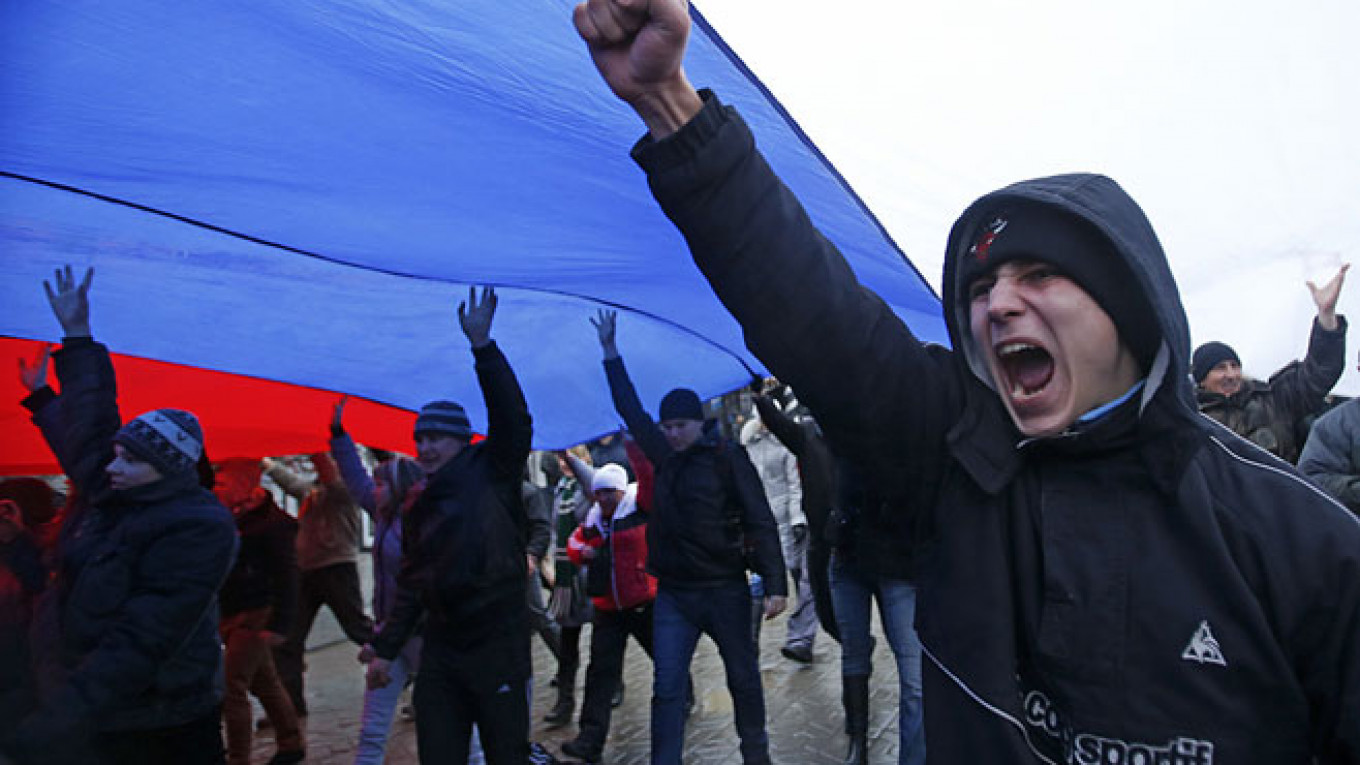Russian news agencies say Ukraine’s fugitive president, Viktor Yanukovych, will hold a news conference in southern Russia.
The reports say the news conference will be held Friday in the city of Rostov-on-Don.
They earlier carried Yanukovych’s statement, in which he claimed he remains the legitimate leader of Ukraine and denounced the new Ukrainian authorities as illegitimate.
Russia-backed Yanukovych has fled Ukraine after signing a peace deal with protesters following violence in which more than 80 people died, most of them protesters killed by government snipers.
Russia scrambled fighter jets to patrol its border and reportedly gave shelter to Ukraine’s fugitive president as pro-Russian gunmen stormed offices of Ukraine’s strategic region, deepening the crisis for the new Ukrainian government even as it was being formed.
The military maneuvers prompted a sharp rebuke from U.S. Secretary of State John Kerry, who warned Russia that any military intervention in Ukraine would be a “grave mistake.”
The moves also pose an immediate challenge to Ukraine’s new authorities as they seek to set up an interim government for the country, whose population is divided in loyalties between Russia and the West. Ukraine’s new prime minister said the country’s future lies in the European Union but with friendly relations with Russia. A Russian news organization reported that President Viktor Yanukovych, who was driven out of Kiev by a three-month protest movement, was staying in a Kremlin sanatorium just outside Moscow.
“I have to ask Russia to ensure my personal safety from extremists,” Yanukovych said in a statement carried by Russian news agencies Thursday. He said he still considers himself president and sees the new authorities as illegitimate.
Oleksandr Turchynov, who stepped in as acting president after Yanukovych’s flight, condemned the takeover of government buildings in Crimea as a “crime against the government of Ukraine.” He warned that any move by Russian troops off of their base in Crimea “will be considered a military aggression.”
“Unidentified people with automatic weapons, explosives and grenades have taken over the governmental buildings and the parliament building in the autonomous region of Crimea,” he said. “I have given orders to the military to use all methods necessary to protect the citizens, punish the criminals, and to free the buildings.”
In Kiev, lawmakers chose Arseny Yatsenyuk as the new prime minister. He will face the hugely complicated task of restoring stability in a country that is not only deeply divided politically but on the verge of financial collapse. The 39-year-old served as economy minister, foreign minister and parliamentary speaker before Yanukovych took office in 2010, and is widely viewed as a technocratic reformer who enjoys U.S. support. Shortly before the lawmakers chose him as the leader of the new Cabinet, Yatsenyuk said Ukraine does not want a fight with Russia, but insisted the country would not accept the secession of the southern Crimea region.
He said Crimea “has been and will be a part of Ukraine.” Yanukovych fled after riot police attacked protesters in Kiev’s central square, killing more than 80 people, and European and Russian officials intervened. He has not been seen publicly since Saturday, when he said he remained the legitimately elected president — a position that has been backed by Russia.
In a clear warning to Ukraine, President Vladimir Putin on Wednesday ordered massive military exercises involving most of the military units in western Russia. On Thursday, as part of the exercises, fighter jets were put on combat alert and were patrolling the border, Russia’s Defense Ministry said in a statement.
The Russian Foreign Ministry voiced concern Thursday about the Russian-speaking population in Ukraine and vowed to protect their interests. State-owned Itar-Tass news agency quoted a statement read at a session of the ministry’s board on Thursday, saying that Russia “will have a firm and uncompromising response to violations of the rights of compatriots by foreign states.”
Russia has accused Ukraine’s interim leaders of failing to control radicals who threaten the Russia-speaking population in Ukraine’s east and south, which includes the Crimean Peninsula.
Witnesses said the gunmen in Simferopol wore unmarked camouflage uniforms and carried rocket-propelled grenades, sniper rifles and other weapons. The men did not immediately voice demands and threw a flash grenade in response to a journalist’s questions. They wore black and orange ribbons, a Russian symbol of the victory in World War II, and put up a sign reading “Crimea is Russia.”
Maxim, a pro-Russian activist who refused to give his last name, said he and other activists had camped overnight outside the local parliament in Simferopol when 50 to 60 heavily armed men wearing flak jackets and carrying rocket-propelled grenade launchers and sniper rifles took over the building.
“Our activists were sitting there all night calmly, building the barricades,” he said. “At 5 o’clock unknown men turned up and went to the building. They got into the courtyard and put everyone on the ground.”
“They were asking who we were. When we said we stand for the Russian language and Russia, they said: ‘Do not be afraid. We are with you.’”
A Message from The Moscow Times:
Dear readers,
We are facing unprecedented challenges. Russia's Prosecutor General's Office has designated The Moscow Times as an "undesirable" organization, criminalizing our work and putting our staff at risk of prosecution. This follows our earlier unjust labeling as a "foreign agent."
These actions are direct attempts to silence independent journalism in Russia. The authorities claim our work "discredits the decisions of the Russian leadership." We see things differently: we strive to provide accurate, unbiased reporting on Russia.
We, the journalists of The Moscow Times, refuse to be silenced. But to continue our work, we need your help.
Your support, no matter how small, makes a world of difference. If you can, please support us monthly starting from just $2. It's quick to set up, and every contribution makes a significant impact.
By supporting The Moscow Times, you're defending open, independent journalism in the face of repression. Thank you for standing with us.
Remind me later.






